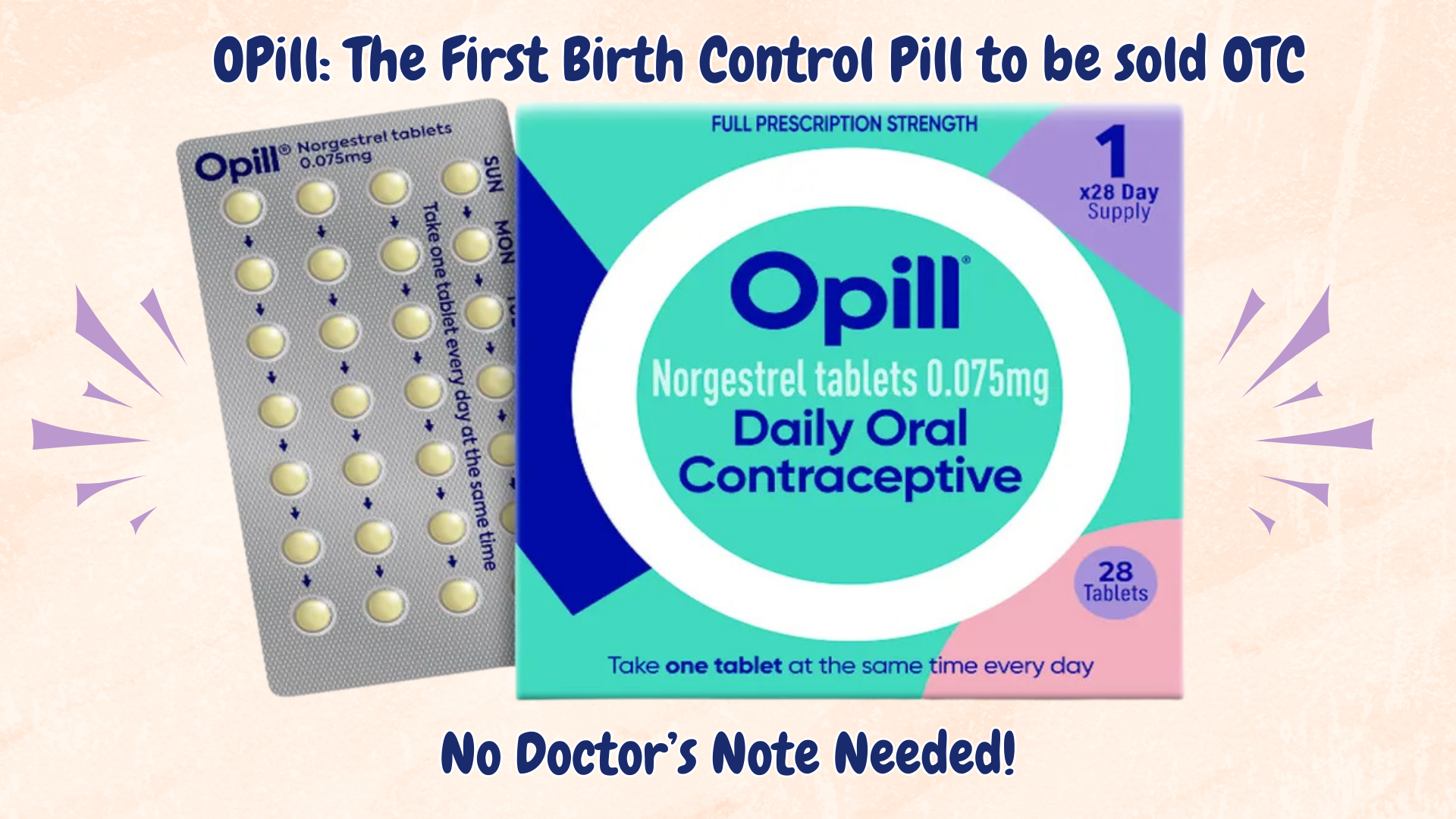Written by Sam, RSEI Educator | Published August 3rd, 2023
What is OPill?
On Thursday, July 13, 2023, the Food and Drug Administration (FDA) approved OPill, the first non-prescription birth control pill for use in the United States–potentially allowing millions of people access to a safe, effective oral contraceptive during a pivotal time when many states across the U.S. have continued to restrict access to birth control, abortion services and other forms of reproductive health care.
OPill, sold in boxes containing a 28-day supply, may be available as soon as 2024 and will be sold over the counter in a wide range of venues, from online markets to drug stores, convenience stores, and grocery stores. Retail prices will be released in the coming months.
What is OPill made of?
Opill is the brand name for the drug “Norgestrel” and comes in tablet form. OPill does not contain estrogen and is considered a progestin-only pill. Progestin is a synthetic version of the hormone progesterone, which is often produced naturally in the body during pregnancy to prevent ovulation.
Note: Hormonal birth control pills vary in terms of their contents. Some birth control pills are progestin-only, while others are a combination of progestin and estrogen. Both types are highly effective at preventing pregnancy and people can decide which, if any, is best for them.
How does OPill work?
OPill prevents pregnancy in a few ways. According to the FDA, OPill stops the release of an egg from the ovary as well as thickens the cervical mucus which helps prevent the sperm from reaching a potential egg. In the case of fertilization, OPill also thins the lining of the uterus to make implantation less likely.
How effective is OPill?
According to the FDA, OPill can be up to 98% effective at preventing pregnancy if used correctly. In order for OPill to be most effective, it must be taken at the same time every day. Note: OPill does become less effective if it isn’t taken within 3 hours of the same time.
Patrizia Cavazzoni, M.D., director of the FDA’s Center for Drug Evaluation and Research said “When used as directed, daily oral contraception [Opill] is safe and is expected to be more effective than currently available non-prescription contraceptive methods [like condoms] in preventing unintended pregnancy.” If someone misses, forgets, and/or experiences a delay in taking the daily pill, it is recommended they consider backup methods, like condoms and/or emergency contraception.
When it comes to weight restrictions, the FDA has shared that “some studies have suggested that hormonal contraceptives (not just [OPill]) might have somewhat reduced effectiveness for [those] who are [above a certain weight].” Currently, available data is not clear; however, you can stay up to date about related weight restrictions by visiting the FDA.
Note: OPill, like other hormonal birth control methods, does NOT protect against sexually transmitted infections (STIs). It is solely a contraceptive method that prevents pregnancy. To prevent STIs, it is important to use barrier methods such as condoms in addition to the OPill.
What are the side effects of OPill?
Most hormonal methods, whether the pill, the ring, the patch, etc. impact people differently. However, common side effects of Opill may include irregular vaginal bleeding, nausea, breast/chest tenderness, and headaches. These side effects tend to be mild and often go away on their own. However, if these symptoms continue or someone is experiencing pain and discomfort, it is important to seek medical advice and/or visit a health center.
Why is OPill available over the counter while other birth control pills are not?
In 1973, the drug Norgestrel (OPill) was initially approved for prescription use only. However, HRA Pharma recently applied to switch OPill from a prescription-based drug to an over-the-counter drug based on data demonstrating that OPill “can be used by consumers safely and effectively, relying only on the nonprescription drug labeling without any assistance from a healthcare professional.”
As studies concluded that public consumers could understand the labeling instructions and use the drug safely and effectively without the supervision of a medical provider, OPill was given FDA approval on July 13, 2023. OPill’s previous prescription status was deemed “not necessary for the protection of the public health” in terms of its dosage, potential side effects, method of use, and/or comprehension of the provided instructions.
As the first non-prescription birth control pill for use in the United States, OPill has opened the door and begun paving the way for other prescription-based products to become more accessible and available over the counter.
What are the potential impacts of having a birth control pill available over the counter?
Having a highly effective, over-the-counter birth control method aims to increase access for:
- Those who might not have a trusted medical provider
- Those who have a general distrust of the medical industry
- Those who experience transportation barriers
- Those who cannot access care in their first and/or preferred language
- Those who live in rural areas where health centers and medical care are not readily accessible
- Those with different disabilities (intellectual, cognitive, verbal, physical, etc)
- Young people who may be facing (age) restrictions to access other contraceptive methods or who face sexual health stigma
Is OPill right for me?
This will vary. OPill is intended to be used by people with a vagina and/or a uterus who are planning to prevent and/or time a pregnancy.
OPill might be right for some people and not for others. Everyone deserves the right to decide what their preferred birth control method is. This may depend on someone’s preference, comfort, ability, values, financial security, and even circumstance.
If unsure about which birth control method is best for you, consider talking to a medical provider about different birth control options based on your comfort, preference, and lifestyle.
For more information about OPill and its 2024 release, visit the FDA.
To learn about additional birth control methods, visit: https://www.plannedparenthood.org/learn/birth-control and bedsider.org.





